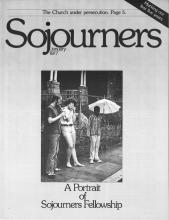This issue of Sojourners marks our first five years of publishing. The Post American (our former name) was first published in the fall of 1971. Since that time, a community has emerged to become the foundation for the publication as well as the basis for a wide range of other ministries.
We felt it would be appropriate to respond to the questions we are often asked about the community and to reflect on the past five years. Wes Michaelson interviewed Jim Wallis, Joe Roos, Jackie Sabath and Bob Sabath--all who have been in the community since the early days and who are now part of the leadership of the fellowship.
Wes: Could you talk about the circumstances which brought about the publication of the Post-American?
Jim: We have to begin in the fall of 1970, a whole year before the magazine was published, when seven or eight of us first met as seminary students at Trinity Evangelical Divinity School, north of Chicago. We had come from very diverse backgrounds, all the way from the radical student movement and antiwar organizing to very conservative evangelical colleges. Our common struggle became to understand what it meant to be biblical Christians in the present American situation. There was a catalytic explosiveness in the coming together of our many backgrounds and experiences which resulted in the publication of the Post-American in the fall of 1971.
Wes: What were the personal political and spiritual journeys that brought each of you together?
Joe: During college my relationship to Christ became more meaningful and took deeper root. I had become involved with an Inter-Varsity group on campus, and in that environment the deepening of my faith took a personal orientation, but not also a political or social direction.
Read the Full Article

